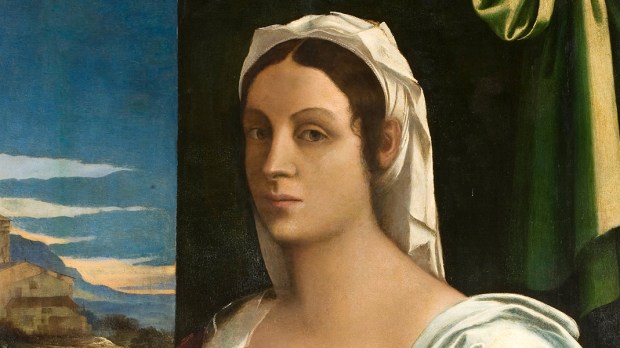A few months ago, I discovered the work of a poet named Vittoria Colonna. She isn’t widely know today, but as I read her poems and fell in love with them, I did some reading about her life and discovered that her influence is secretly quite powerful. As an artist who wrote in depth about her faith, she had a profound effect on the history of Western art.
Her story begins in Italy in 1492. Born to a noble family, she began writing poetry as a young woman when her husband prematurely died. Her first works were memorial poems about him to express her grief. Later, she began to publish intimate poems about her faith. She immediately had fans. A sensitive and intelligent woman, she was respected by leading poets of the day such as Ludovico Ariosto and Jacopo Sannazzaro.
She was so well-regarded that the famous painter Titian painted St. Mary Magdaleneat her request as an illustration for a cycle of sonnets she had written.The poems themselves are gorgeous. The painting is slightly shocking. It shows a sensual and physically attractive woman, and at first I wondered if Titian wasn’t a little too excited to display her beauty. Then I read the poems by Colonna and I understood. Mary Magdalene is an expression of the grace of feminine spirituality — full of desire, nuptial joy, and inner strength. Her physical beauty as a woman is a reflection of the beauty of her soul. In the life of Christ, it was always the women who understood him best, specifically Mary, his mother, and Mary Magdalene, his most devoted follower. There is something irreplaceable about the feminine response to God. Of all the early followers of Christ, it could only have been Mary Magdalene who could be depicted at Titian does, or described as Colonna does; “She lay down at His feet,/ His strong hand drew her up – the true lover/ who simply accepts her heart welcomes her.”
The Titian painting was done around the year 1531, showing that Vittoria Colonna was already quite respected by the best artists working in Italy. I cannot stress enough how unusual this would have been, for a widowed woman – or any woman at all — to be active and accepted into an all-male artistic community at the height of the Renaissance. By writing intimate, spiritually searching poems about Mary Magdalene, she broke the mold. She is, “the first widow who rebelled by crying out about her pain in sonnets.” By expressing herself so fearlessly, she transformed the very idea of what it meant to search for and find wedded love, whether that love was with a husband or was a spiritual, nuptial relationship with God.
This all happened before she even met Michelangelo.

Read more:
If you want more joy in your life, add some poetry to it
We all know Michelangelo, sculptor of the David and painter of the Sistine Chapel. What is not well-known, though, is that he and Vittoria Colonna developed an intense, platonic love that shaped his artistic career, spilling over into a creative avalanche of shared poetry and paintings. They met in 1538 and stayed together until the very end. Michelangelo was at her bedside when she died. Throughout their relationship, they had long talks about art, poetry, and faith. They encouraged and supported each other in artist endeavors. Michelangelo felt her death as a major loss, calling her, “the soul and the heart of my fragile life.”
We all need good friends in our lives, people who are sympathetic and encouraging, who we might be so bold as to say are our soul and heart. Even the great artist Michelangelo needed support – who knows what his art would have been like if he had never met Vittoria? Her particular feminine beauty, encouragement, and friendship gave him strength to express his faith through his artistic skill.
Vittoria Colonna was an accomplished artist in her own right, but she spent her time encouraging others and helping them to fulfill their potential.The beauty of her life outshines even the beauty of her poems.
It’s a lesson for all of us. It’s very easy to get wrapped up in our own concerns. When I meet a friend for coffee or arrive home after a long work day to see my wife, the temptation is swift to quickly begin complaining about what’s on my mind, to dwell on what’s bothering me. What if, instead, I chose to speak about uplifting topics? To speak of faith and beauty? To bring out the best in the other person? Vittoria Colonna is one person who can show us the way.

Read more:
How J.R.R. Tolkien spoke about the beauty of Mary

